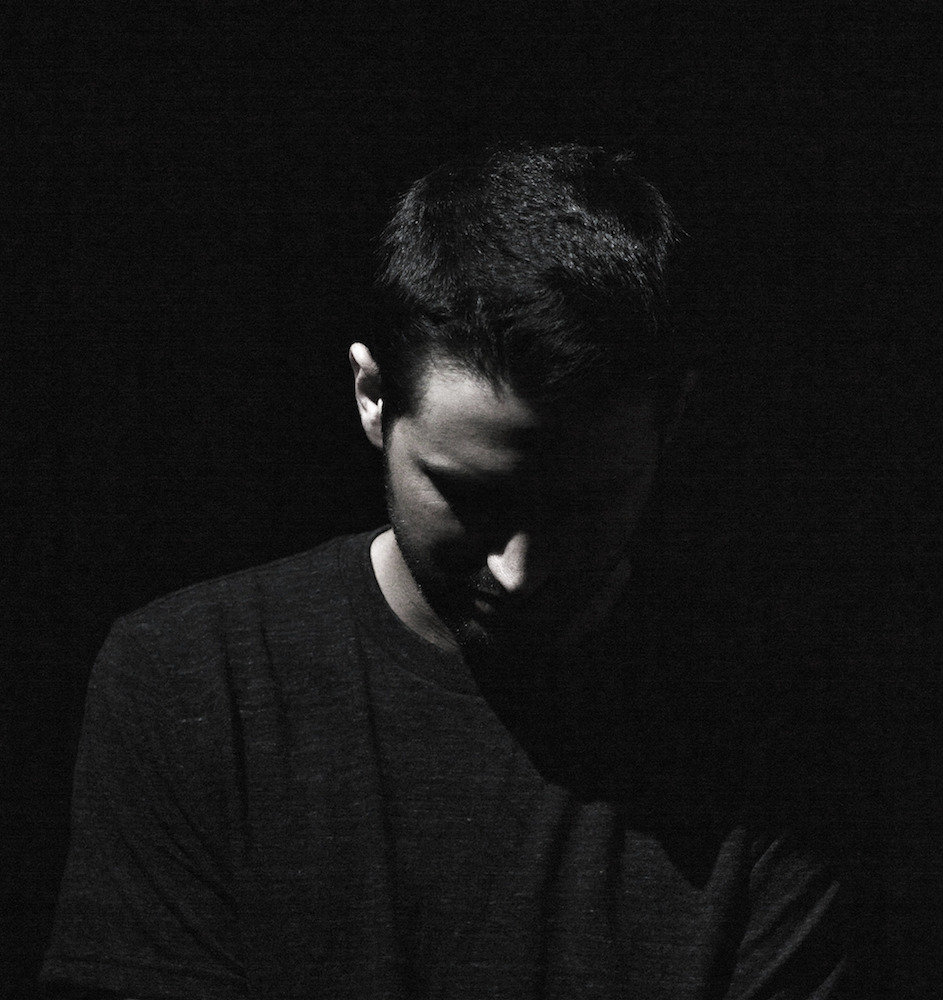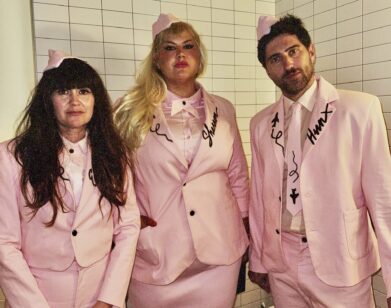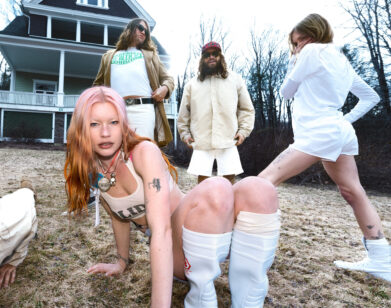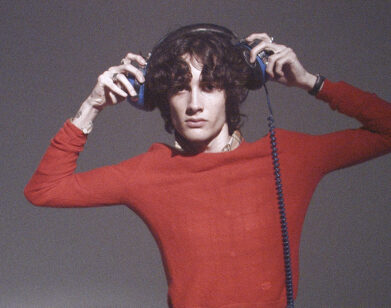Sean Carey’s Supermoon

ABOVE: S. CAREY. PHOTO COURTESY OF CAMERON WITTIG.
In tune with his previous albums, Supermoon, the lates EP from S. Carey, draws much of its inspiration from nature, particularly the perigee-syzygy phenomenon. Once every 14 lunar cycles, a full moon moves to the closest possible distance from Earth, and appears abnormally large. It was during this natural wonder in August when Carey recorded his EP.
The singular original (and titular) track on the EP seems to ponder the relationship between the individual and nature’s magnificence. “Who’s to say where we’ll end up?” Carey coos repeatedly atop a lilting piano track. But Carey’s question is not meant to be a daunting one; the song radiates tranquility rather than melancholia.
The remaining five songs on the album—four alternative versions of tracks from Carey’s 2010 solo debut All We Grow and 2014’s Range of Light and one Radiohead cover—are equally as skeletal in their composition. With only a piano and a pedal board, each version offers a stripped-down alternative to the original, almost as if to reflect the change of season. Recorded at his home in Wisconsin on his family’s piano, the EP reflects the personality of the space: cozy, peaceful, and intimate.
Just before Supermoon‘s release last week, Sean Carey, who is also the drummer and supporting vocalist for Bon Iver, and fellow musician and friend Sam Amidon caught up. The two met in Europe when Amidon was opening for Bon Iver. We listened in from New York. —Savannah O’Leary
SAM AMIDON: How’s it going man?
S. CAREY: Good. How are you Sam?
AMIDON: I’m very well. Where are you?
CAREY: We’re on tour actually. We’re in Oklahoma.
AMIDON: Amazing. Are you doing the house concert tour?
CAREY: Yeah, we’re just getting going, we’ve played four shows so far and it’s been really fun. It’s way different than any other tour I’ve been on.
AMIDON: I always find those small, house concert-style shows really scary because you can see every single person’s face looking right at you.
CAREY: Right, but in a way they’re sort of comforting too. You know that everyone there is down to listen and let you do what you want to do and present yourself in a super intimate way. That’s kind of liberating in a way. But yeah, going up to the house is a little nerve-wracking. Every time it’s like, “All right, what’s this going to be like?” What are you up to at the moment?
AMIDON: I’m just home for a while. I watched the Grammys last night, well, with the sound off. I think there are some things that are better with the sound off, and the Grammys is one of them. But then instead of having the sound off, I listened to your beautiful EP and I tried to pretend that Tom Jones and whoever was standing next to him were singing your beautiful music. It made the Grammys so much better.
CAREY: [laughs]
AMIDON: I’m hoping they hire me as sound person next year because I’m just going to drop that shit in. I’m just going to put Supermoon on top of everything… It was so beautiful and great to hear. I love to hear something that’s so paired down but that’s still so lush.
CAREY: Thanks man. It was kind of an experiment, I guess, in that way, just wanting to do something that was really limited in instruments and see how far we could take those instruments.
AMIDON: Did you play solo first and then add the other subtle stuff?
CAREY: Yeah, we had my guitarist’s peddle board, and that was kind of our only way to make the atmospheric stuff. We would just run everything through it and then later on we could choose to use it or not. We had the drive signal, and we also had all that ambient stuff, and we could choose when we wanted to have that in there, but everything came from the piano. A lot of it was just one or two takes on the piano until the vibe was right and then we’d move on. It was refreshing in that way. I wasn’t going to spend three years making it. It was like, “Oh, let’s do this over a weekend.”
AMIDON: And capture that moment in that way.
CAREY: Yeah.
AMIDON: Was that in Wisconsin?
CAREY: Yeah, it was in August. We just did it right in my house. The super moon was out that weekend, and I don’t know, I’m not really…
AMIDON: It blew your mind.
CAREY: It’s just amazing. I’m not super into that stuff, but it can have the ability to make it feel weird or different. I know some people, it makes them feel really uneasy when that happens, or even during every full moon. Anything that weird is sort of inspiring in a way, you know?
AMIDON: Absolutely. And do you live out in the woods? Can you wander out in the middle of the night and it’s just staring down at you?
CAREY: I don’t. I live in town, but there are still a lot of trees and woods that are close.
AMIDON: I grew up in Vermont and I say that a lot, so people think I grew up in a hole, in a tree, in a mountain, but actually we lived downtown. In a weird way, it made that yearning for nature even stronger because my friends lived in the woods. I would go play at my friend’s house and they were all out in the woods. Home was in town, which was fun, but then it just gave me even more of that yearning and appreciation for that kind of space, which I’m sure is true for you as well in that area. But you don’t have to go far for it to feel completely different.
CAREY: Exactly. That’s one of the things I really like about living in Eau Claire. I can be in the woods and be pretty secluded and pretty alone in a matter of minutes.
AMIDON: I’m so psyched! I’m going to come out for the festival in the summer.
CAREY: Yeah, that’s going to be great. Are you going to bring your band? Are you going to bring [Bill] Frisell with you?
AMIDON: I think I’ll have to call him up the day before and see where he is. That’s been by best luck with Bill. For somebody who is, like, in his mid-60s, it’s kind of amazing how he’s that kind of person—you just have to look at his calendar and figure out where in the universe he is, or whether he’s on the super moon. But this summer will be great. I can’t wait because I’ve heard so much about your whole world that you guys all live in. The closest I’ve passed through was Minneapolis. What’s the guitar tech dude from Bon Iver? The super nice dude who has two kids?
CAREY: Todd [Lunneborg]?
AMIDON: Yeah, Todd. Todd came out with his kids when I was playing in Minneapolis. I think the rest of you were still on tour. You did a tour with Califone, right?
CAREY: Yeah in September.
AMIDON: I bumped into Tim [Rutili], who I’d never met, but I loved their band and I bumped into him for like 10 minutes in Berlin last November. We were both doing radio hits in a studio. It was great to meet him.
CAREY: I think your humor would align pretty well.
AMIDON: I love his stuff. So I put on your album, I’ve listened to it many times, but I put it on again to get into the vibe before we were going to speak today. I had it in the car with my two kids, and Nancy, my stepdaughter who is eight, we listened in silence for a while, and then she said, “Who is he making this for?” So that’s my question. I was trying to think of what I could ask you, and she is my ghost interviewer.
CAREY: That’s really good.
AMIDON: It’s a very mysterious question. You have to answer. You can’t ignore a child.
CAREY: I think with that record it was for myself. [That] is the answer that comes to mind first.
AMIDON: That’s probably the right answer to start with. And this is a really boring question, but the answer is often interesting: what comes first for you as a writer, the words or the music?
CAREY: Most often it’s always music and then it takes me like a month to write lyrics.
AMIDON: Lyrics must be so hard. I’ve never tried that.
CAREY: You get off easy, man!
AMIDON: I know, damn! I can’t imagine trying to make up new words, what a disaster. And that makes sense, because your music comes from such an internal space, but it’s very open music at the same time. It’s a very internal space and, because it’s winter right now, I think of the snow when I hear you. There’s a particular quiet of going outside when the snow has fallen, that really amazing muffled, quiet silence, which is so hard to find anywhere else in the universe. Maybe I’m projecting because I know you live in the North and right now I’m in Los Angeles and I wish I was in the snow.
CAREY: I think there’s some truth to that and a lot of writing happens in the winter because there’s less to do and there’s usually less touring going on. I think that’s fair. I mean, I get inspired by all that stuff, any sort of nature. I love the first time it really snows. My wife hates it; she probably wants to move to Los Angeles.
AMIDON: Are you playing solo on this tour? Or do you have a little band?
CAREY: Yeah, I have a couple guys, Ben Lester and Zach Hanson.
AMIDON: Is it amplified, the shows? Even though they’re house concerts? Or are they sort of semi-amplified…how does that work with the intimacy of it?
CAREY: We have an electric guitar, a kick drum, and a pedal steel, and I have my whirly. Then we have one little PA speaker and I sing on a mic. I thought I would wear my voice out if I tried to sing totally acoustic every night. We’re pretty soft.
AMIDSON: Having a mic on the voice always you to sing, ironically, more intimately, ’cause you’re not projecting to the room.
CAREY: Yeah, totally.
AMIDON: We first met in Spain or Portugal? I was opening for Bon Iver and you guys were very warm and took great care of me. And the audience was really amazing. But I’m still trying to beat my record of only one CD sold…if you remember that.
CAREY: [laughs] That’s ridiculous.
AMIDON: It turned around in the other direction once we got to Germany, but it was great to see you. It was only like four days that we’ve actually been in the same physical space.
CAREY: Something like that. But I’ll never forget the first time I heard your music. I was in London on the first Bon Iver European tour, and they were playing “All is Well.” It might have been the only time I’ve done this, but I just had to go up in and say, “What the hell man?” That record has definitely stuck with me that whole time as one of my favorites.
AMIDON: That is cool. With the whole world of Twitter and stuff it’s nice to be able to see what people are doing even if you’re not always in direct contact with them. I have one question I just thought of that’s totally random. Did you read Bob Dylan’s speech that he gave on Friday?
CAREY: No, I didn’t.
AMIDON: Oh you gotta check it out, it’s amazing. He talks a lot about the connection between old folk songs and writing, and it’s really beautiful the way he talks about it. One thing that’s also amazing about it that he’s really sensitive about reviews, including his most recent album. He admits that he’s read all the reviews.
CAREY: I can’t do that.
AMIDON: I couldn’t believe he would talk about that, but the part of it that’s great is the way he talks about songs.
CAREY: I’ll check it out. I’ve been on a huge Nashville Skyline kick lately.
AMIDON: Ah, I don’t know that record.
CAREY: Really!? I think it’s great because he kind of has this crooner voice. I love it.
AMIDON: The new one, the album he just put out, it’s beautiful, and would probably go well with what you’re listening to. It’s like another moment where he just steps into a different… He’s going for a sort of softer vibe.
CAREY: Cool. Hey, we’re going to be in Burlington in April, do you have any suggestions where should we go?
AMIDON: I’m from Brattleboro, which is like the southern corner of the state. It’s sometimes not even considered Burlington…more like North Hampton vibe, but it’s totally beautiful and Burlington is right in the middle of all the most beautiful stuff. I’ll think about it. I wish I had some perfect Vermont suggestion. My friend Sam Bartley, when he was in high school, Ben and Jerry were the two hippies down the street with an ice cream stand who he’d go hang out with after school. So maybe I’ll go ask him, he’ll have some deep Vermont advice for you.
CAREY: Sounds good.
AMIDON: You should go to a sacred harps thing if you can find one, or a contra dance. It’s like granola, hippy, square-dance-slash-yoga vibes. You wouldn’t want to miss it.
CAREY: That sounds crazy.
AMIDON: But it was my whole musical world growing up because I played fiddle mainly until 10 years ago. I played fiddle for this folk dancing called contra dancing, but it was amazing musical training because it was like four hours and you play for four hours. They don’t care what you do as long as it’s danceable rhythms, so it gets you into a good place musically but it’s also a surreal cultural space. I recommend it.
CAREY: Nice. I’ll try to catch ’em.
AMIDON: Cool man, sounds good. I have to run in a minute because I have another appointment, but it’s fantastic to chat.
CAREY: Yeah, thank you for talking Sam.
FOR MORE INFORMATION ON S. CAREY, VISIT HIS WEBSITE.






